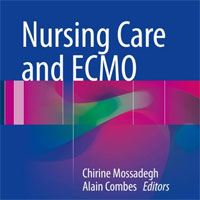
Distinguishing Pneumonia From Pneumonitis to Safely Discontinue Antibiotics
Consequences of pulmonary aspiration can be biphasic with dissimilar sequelae. An early phase, coined pneumonitis, involves an inflammatory reaction to gastrointestinal contents with a pH typically less than 2.4 resulting... read more

Start a Neonatal ECMO Program: A Multistep Team Training
The multistep extracorporeal membrane oxygenation (ECMO) team training increased staff' knowledge, technical skills, teamwork, and self-confidence, allowing the successful development of a neonatal respiratory ECMO program.... read more

Non-invasive Ventilation in the ED: Whom, When, How?
Timely use of NIV in the ED may decrease the need for invasive ventilation and its associated complications. The appropriate device, interface and patient selection are, therefore, key components of NIV success. Once the... read more

Intubation in Special Patient Populations: Intracranial Hemorrhage
Lidocaine has weak evidence to support its ICP blunting effects. Fentanyl may be a better choice. Ketamine is a reasonable alternative to etomidate during induction. No differnce in mortality exists between usage of succinylcholine... read more

Lighter Emergency Breathing Tubes Associated with Higher Survival After OHCA
In the LT group, 18.3% of patients survived 72 hours in the hospital, compared to 15.4% in the intubation group. From the LT group, 10.8% survived to hospital discharge, and only 8.1% in the intubation group. The proportion... read more

Losing Sleep Over Delirium
Delirium is an acute cognitive disorder that presents with alterations in levels of consciousness accompanied by a change in cognition or perceptual disturbance that develops over a short period (hours to days) and fluctuates... read more

Current efforts to fight sepsis aren’t working. We need a bolder approach
Thanks to antibiotics, vaccinations, and public health advances like modern sanitation, it's easy to think that Americans live largely free of the infectious diseases that once took such a toll. That’s partially right:... read more

Management and Outcomes of ARDS Patients With and Without Comorbid Conditions
Half the patients with acute respiratory distress syndrome (ARDS) had major comorbidities, which were associated with severe ARDS, multiple organ dysfunction, and day‑28 mortality. These findings do not support the exclusion... read more

The Fluid Debate: Balanced or Unbalanced
Consider using balanced fluids in your ED unless you are treating a patient at risk for cerebral edema, or a patient with a chloride responsive metabolic alkalosis, e.g. from gastric losses. Although the superiority of balanced... read more

Very high intact-protein formula successfully provides protein intake according to nutritional recommendations in overweight critically ill patients
Enteral feeding with VHPF (8 g/100 kcal) resulted in higher protein intake and plasma amino acid concentrations than an isocaloric SHPF (5 g/100 kcal), without an increase in energy intake. This VHPF facilitates feeding according... read more

Immunocompromised Patients with ARDS
Immunosuppression is frequent in patients with acute respiratory distress syndrome (ARDS), and infections are the main risk factors for ARDS in these immunocompromised patients. Their management differs from that of immunocompetent... read more

Effects of Chlorhexidine Gluconate Oral Care on Hospital Mortality
Chlorhexidine oral care is widely used in critically and non-critically ill hospitalized patients to maintain oral health. We investigated the effect of chlorhexidine oral care on mortality in a general hospitalized population.... read more
The Role of Nutrition in Strong for Surgery
Host Paul Wischmeyer is joined by Thomas Varghese, MD, section head of General Thoracic Surgery at the University of Utah, to discuss the role of nutrition in the American College of Surgeons’ Strong for Surgery initiative.... read more

The Only EKG Book You’ll Ever Need
Clear and concise, The Only EKG Book You'll Ever Need has provided quick and accurate discussions on using an EKG to diagnose cardiac and non-cardiac conditions for nearly 30 years. This ninth edition is packed with full-color... read more








